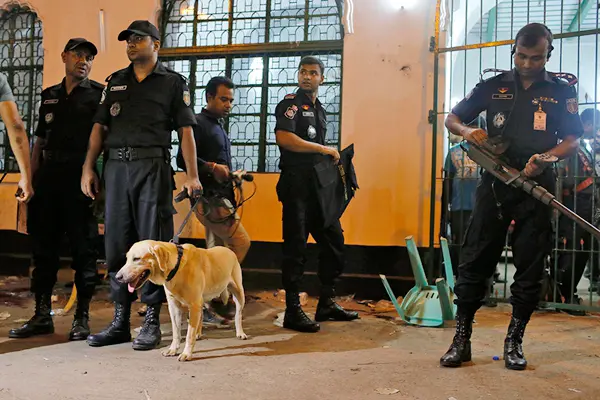Bangladesh authorities have decided to heighten security in capital Dhaka and elsewhere the country as part of their efforts to ensure foolproof security for celebrating Bengali New Year.
Dhaka Metropolitan Police Commissioner Asaduzzaman Mia told journalists Monday that stringent measures will be put in place to prevent any disturbance in the festivities of the Bengali New Year which falls on April 14.
"There will be no scope for creating chaos during this year's festivity," he said.
According to him, there will be three control rooms, a number of observation towers, many closed circuit television cameras and check posts in the strategically important places including main venue of the festival at Dhaka University premises.
"We won't allow an open air cultural program after 5:00 p.m. (local time)," he reiterated.
Bomb-disposal experts and dog squads will also patrol the main festival premises including Dhaka's Ramna park, the main venue of celebrations in the city, and adjoining areas with back-up forces to face any situation.
Tens of thousands of people in masks and traditional dresses, mostly students of colleges and universities, are expected to bring out a colorful procession in Dhaka, ushering in good spirits for the new year.
At the forefront of the parade are supposed to be students of Dhaka University who usually carry large size bamboo made symbolic figures of owl, tortoise, tiger and elephant.
Sources said some 10,000 security persons including policemen, elite force Rapid Action Battalion and SWAT (Special Weapons And Tactics) are being deployed to ensure security.
Mia said officials of the intelligent units including Special Branch (SB) will also jointly work and remain on ground in plain clothes to avert any untoward situation during the celebration.
Sources said the government takes extreme security measures as extremist groups seemed to be active.
At least eight people were killed and many more injured in a powerful bomb explosion at the main Bengali new year celebration program in Dhaka in 2001.
Sources also said that authorities tightened measures this year more specially in the wake of last year's most unpleasant incident.
The joyous celebration of the Bengali New Year was marred by a mass sexual assault against a group of women on the campus of Dhaka University last year.
Some 30 to 40 rowdy youths assaulted and sexually harassed around 20 women at the gate of Dhaka's lush green Suhrawardy Udyan Park while the women were returning home late afternoon after celebrating the New Year along with family members and friends.
The incident caused a massive demonstration of indignation and anger throughout the county.
Moguhal Emperor Akbar introduced the Bangla calendar year and the celebration of Pahela Baishakh, marking the advent of Bengali New Year, which is now considered as an integral part of the Bengali's cultural heritage and tradition.
The Mughal Dynasty ruled most of the Indian subcontinent for three centuries (1526-1707).
The Bengali New Year coincides with the mid-April New Year in Cambodia and a number of countries in the Indian subcontinent that include parts of India, Myanmar, Sri Lanka and Thailand. Enditem
 简体中文
简体中文

